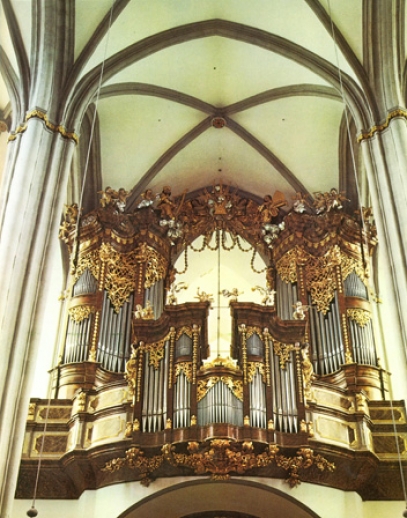


Zwettl abbey
Johann Ignaz Egedacher 1728-1731
State of preservation: In 1853 and 1880 romanticised, but majority of technical construction pipes maintained; restored in 1981-83 and 1991.
The western organ of Zwettl is one the most impressive creations of the Egedacher family. Avoiding obstruction of the western window went to a radical solution: What appears as the case of the major part of the organ right and left of the window is rather shallow and only contains the pedal stops including Prinzipal 16’ in the façade. All three manuals however are joined together in the no less impressive parapet case.
Since the manuals are not separated in space, their differences are achieved by contrasting sound characters of the single divisions. So the major divisions resemble conventional separate organs combined, a bigger (HW) vs. a smaller organ (Pos) and for the third manual „absonderliche und Special Galanteri Register,“ in fact an individual interpretation of a French „Cornet Recit“ with a specific combination of stops, each divided and over the whole compass.
Music sample
Johann Joseph Fux (1660-1741) : Sonata terza
Gespielt von Elisabeth Ullmann
Specification (contract of 1728):
III+P; manuals C-c3, pedal C-g#0
HW:
Prinzipal 8’
Coppel 8’
Gamba 8’
Octav 4’
Hohlflöte 4’
Bifara 4’
Quint 2 2/3’
Superoctav 2’
Horn 2’ 2f.
Mixtur 2’ 2f.
Cymbel 1’ 3f.
Pos:
Coppel 8’
Prinzipal 4’
Rohrflöte 4’
Octav 2’
Quint 1 1/3’
Mixtur 1’ 3f.
„das dritte Clavir“ (divided sliders between b0/c1):
Coppel/Flöte 8’
Dulciana/Schwiegel 4’
Flageolett/Flageolett 2’
Fagott/Oboe 8’
P:
Prinzipal 16’
Subbaß 16’
Prinzipal 8’
Nasard 5 1/3’
Superoctav 4’
Quint 2 2/3’
Horn 2’ 2f.
Mixtur 2’ 6f.
Cymbel 1 1/3’ 4f.
Bombardon 32’
Coupler HW/Pos
© Greifenberger Institut für Musikinstrumentenkunde | info@greifenberger-institut.de




